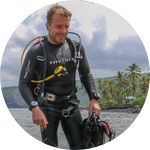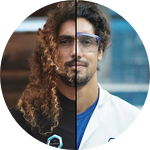About This Project
Corals are one of the most important keystone species on the planet and greatly depend on the microbes in their mucus for survival. This study will test the hypothesis that the microbial community within coral mucus exhibits physicochemical responses during heavy sedimentation events. More specifically, coral reefs that can maintain their steady-state surface layer mucus microbiome will exhibit less signs of physiological stress.
Ask the Scientists
Join The DiscussionWhat is the context of this research?
Microbiome research, the study of microbial communities within a system, is quickly transforming the way we interpret medicine, manage commerce and understand the environment. Metabolomic research, the study of specialized molecules and their functions, is a rapidly emerging field that allows researchers to interpret chemical shifts within and between systems. Previous research suggest that heavy land runoff is detrimental to coral health, but the corals in Hilo appear to be thriving while experiencing land runoff. Essentially no studies have combined microbiome and metabolome research to investigate the influence of land runoff on coral systems. We hope to study how the unique microbe and molecules of Hilo corals make them so special and resilient.
What is the significance of this project?
Although land runoff greatly threatens coral reef ecosystems, the microbial effects of sedimentation on coral mucus remain unexplored. There is a critical need to implement next-generation analytical tools such as microbiome and metabolome research to better understand the microbial dynamics associated with host survival and their associated mucus. This proposal specifically aims to identify key molecular shifts that lead to host death after sedimentation and also introduce structure-from-motion photogrammetry to characterize nonlethal host responses after environmental disturbances. Methods developed in the basic research serves as a powerful multi-omic profiling tool that can be implemented to other biological systems.
What are the goals of the project?
This study will test the hypothesis that the microbial community within coral mucus exhibits physicochemical responses during heavy sedimentation events. More specifically, coral reefs that can maintain their steady-state surface layer mucus microbiome will exhibit less signs of physiological stress. We plan to dive and collect mucus samples of the coral before, during and after a heavy rain event to understand how the runoff changes the molecular and microbial composition of the reef.
Budget
16s rRNA samples will be collected and processed at a core facility. These samples will then be processed and analyzed through multivariate statistical tests. By identifying molecular trends that surround coral sedimentation events, a better understanding of coral resilience can be achieved. These findings will then be compared and contrasted to social resilience examples found in the surrounding human communities.
Endorsed by
 Project Timeline
Project Timeline
Jan 2022- finish collecting mucus samples after heavy rain event.
March 2022- finish processing samples of mucus samples
June 2022- Complete analysis of results
Aug 2022- Publish Results in peer review Journal
Jan 31, 2022
Finish Sampling Coral mucus at study site
Feb 01, 2022
Project Launched
Feb 15, 2022
Submit samples to 16s rRNA seq at UCSD
Jun 01, 2022
Complete multivariate statistical analysis
Aug 01, 2022
Publish paper
Meet the Team
Affiliates
Clifford Kapono
Dr. Cliff Kapono is a professional surfer, chemist and journalist. Born on the eastern shores of Hawai‘i, his life involves equal parts science as it does surf. While contributing several peer-reviewed publications to the fields of molecular bioscience, he has also produced a handful award-winning films that discuss indigenous activism, ocean conservation, global food security and virtual reality. He has been profiled in publications such as The New York Times, NBC, CBS, Surfer Magazine, and more. Cliff is currently based in Hilo, Hawai‘i and can be found tinkering in the lab when not chasing the best waves on the planet.
Lab Notes
Nothing posted yet.
Project Backers
- 13Backers
- 56%Funded
- $5,575Total Donations
- $428.85Average Donation

